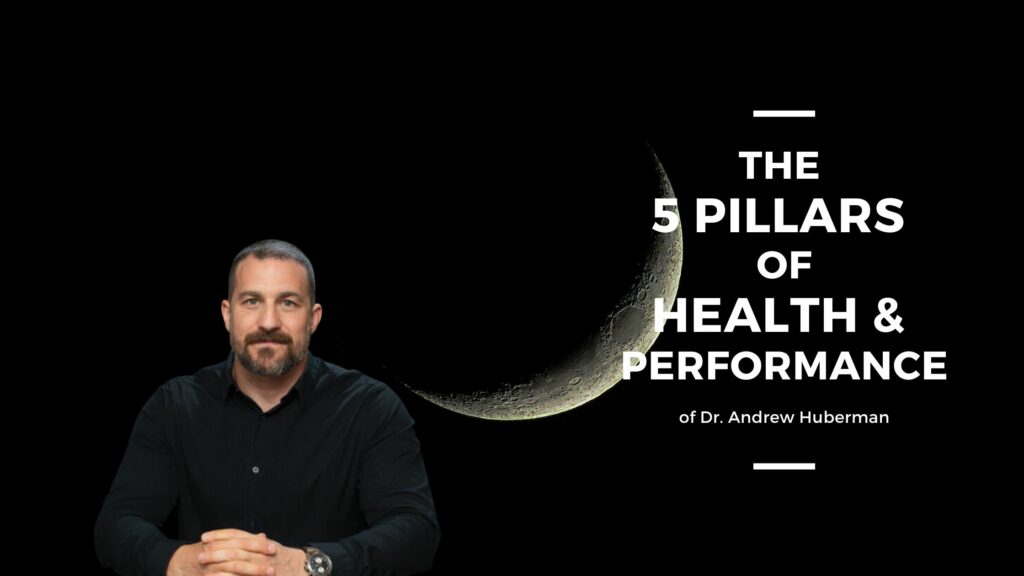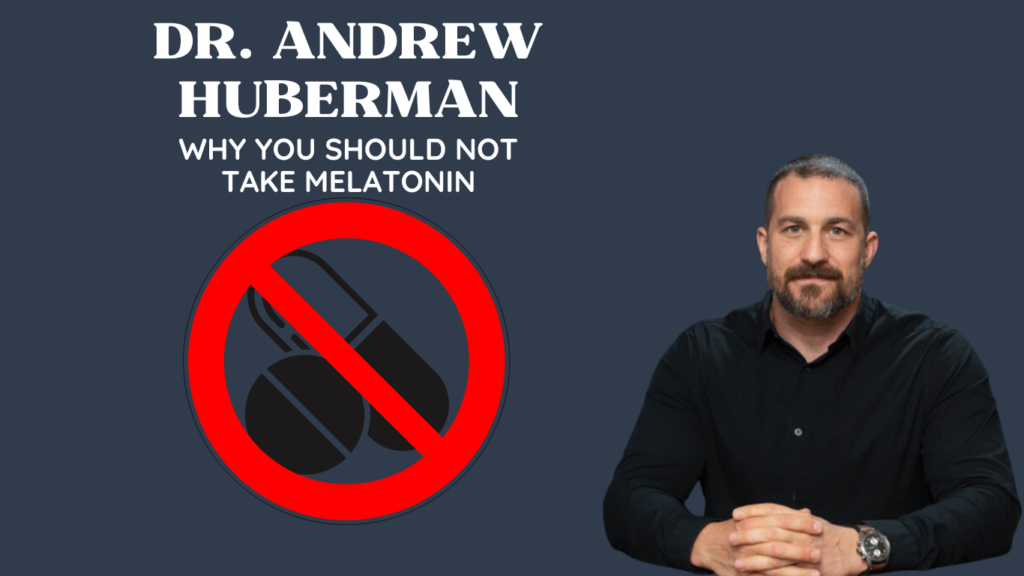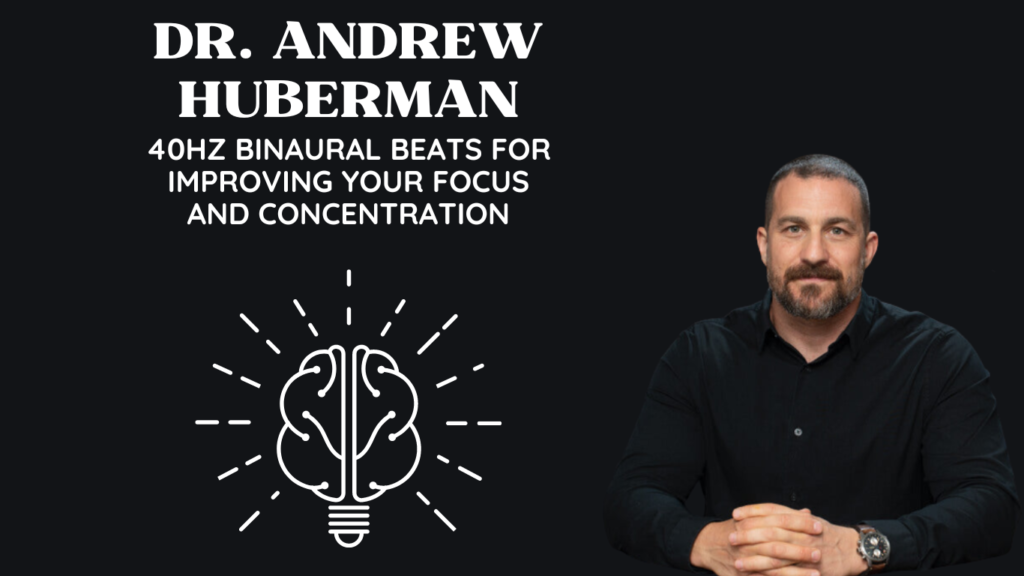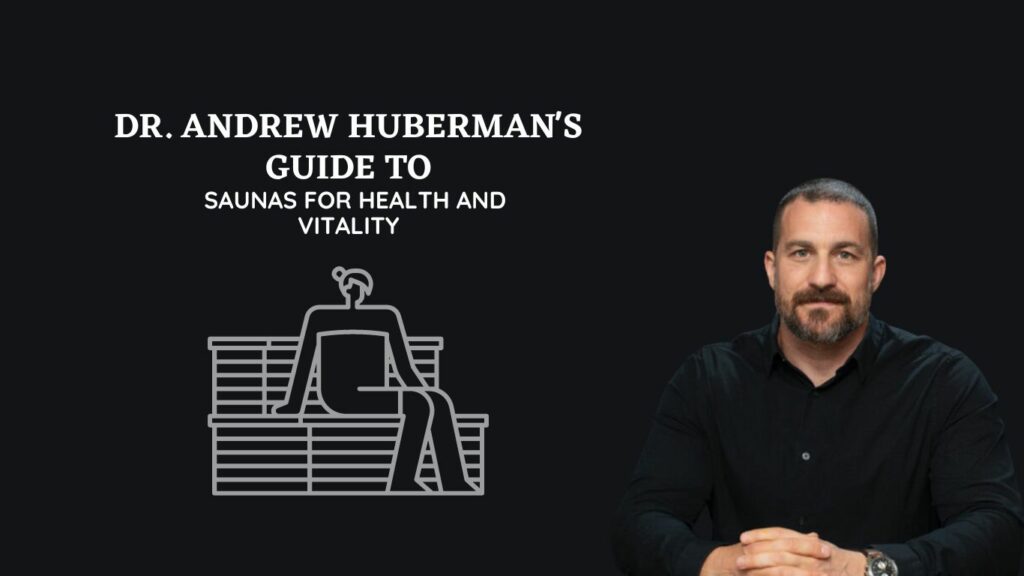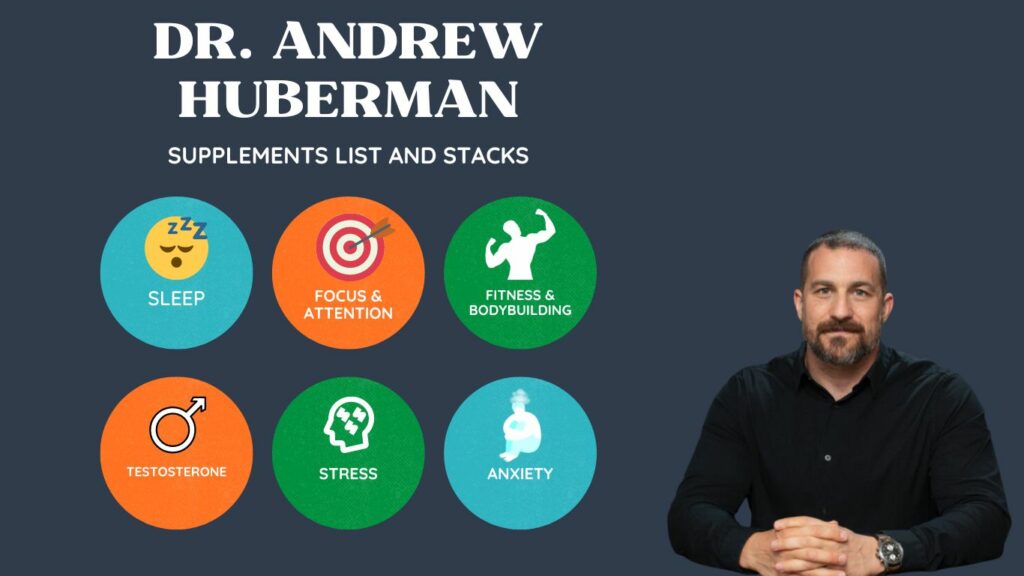In today's fast-paced world, achieving optimal health and peak performance is a goal that many of us strive to attain. We understand that our well-being is not limited to just one aspect of our lives but is instead a holistic integration of various elements. Dr. Andrew Huberman sheds light on this holistic approach to well-being in a captivating interview on “The Tim Ferriss Show.” In this article, we will delve into the insights provided by Dr. Huberman and explore the five pillars that can transform your well-being and enhance your performance.

Dr. Huberman's interview reveals a wealth of knowledge and practical advice that can revolutionize the way we approach our health and performance. By focusing on these five pillars, we can unlock our potential for optimal physical and mental functioning.
These pillars encompass:
- Sleep
- Nutrition
- Movement
- Sunlight
- Relationships
Unlocking Optimal Health and Performance: The 5 Pillars to Transform Your Well-Being
Sleep, often overlooked in our busy lives, forms the foundation of our well-being. We will discuss the neuroscience behind sleep cycles and how they impact our cognitive abilities, energy levels, and overall mental health.
Nutrition plays a vital role in fueling our bodies and minds. We will delve into the power of nutrients, both macronutrients and micronutrients and their impact on our physical and mental health. With guidance on building a balanced and nutritious diet, we can optimize our energy levels, cognitive function, and overall vitality.
Movement goes beyond physical fitness; it also enhances our mental well-being. We will explore the benefits of regular exercise on our cognitive function, emotional well-being, and overall vitality.
Sunlight significantly affects our biological rhythms. We will dive into the importance of sunlight in regulating our sleep quality and circadian rhythm.
Relationships and their impact on our mental and emotional well-being. By nurturing connections with others and ourselves, we can cultivate a sense of belonging and fulfillment.
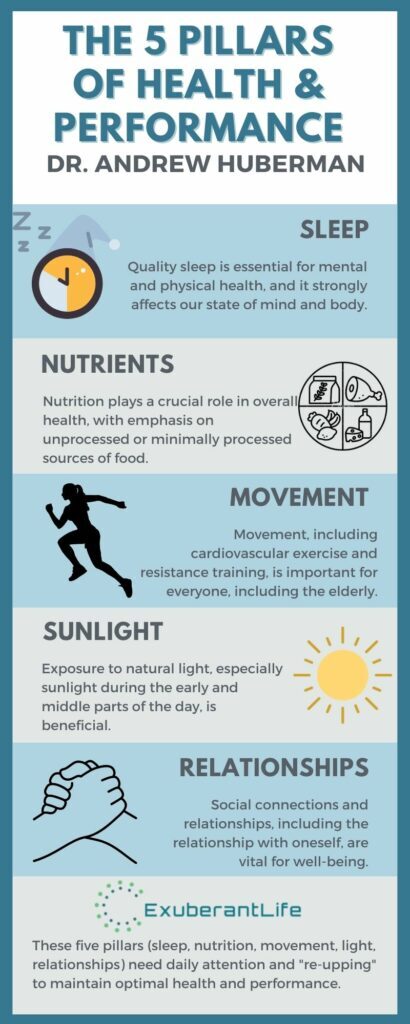
1. The Foundational Role of Sleep
Sleep is a complex process that occurs in cycles, alternating between two main stages: rapid eye movement (REM) sleep and non-rapid eye movement (NREM) sleep. Each cycle typically lasts around 90 minutes, and throughout the night, we go through multiple cycles.
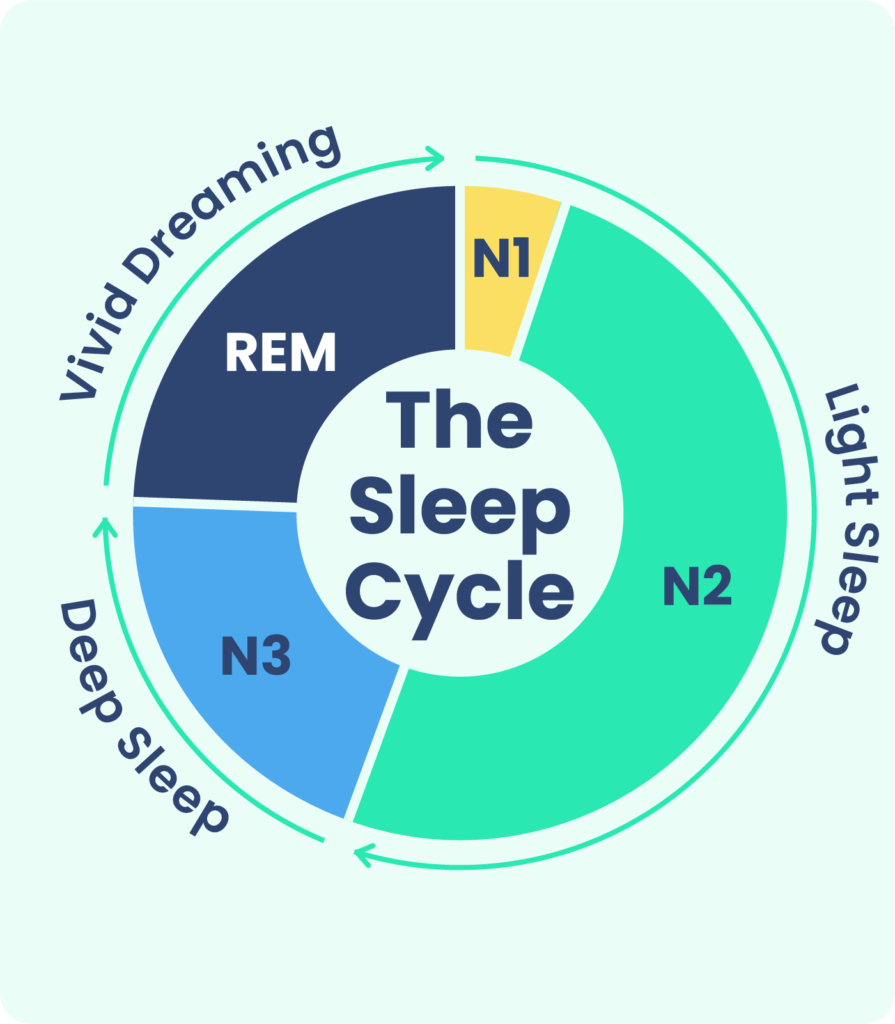
NREM sleep is further divided into three stages, with the third stage being the deepest and most restorative. It is during this deep sleep that our bodies repair and regenerate tissues, support immune function, and consolidate memories. REM sleep, on the other hand, is associated with dreaming and plays a crucial role in cognitive function, learning, and emotional regulation.
The Impact of Sleep on Cognitive Function
Quality sleep is essential for optimal cognitive function. Lack of sleep or poor sleep quality can impair our ability to focus, concentrate, and make decisions. It affects our memory, creativity, and problem-solving skills. Without sufficient sleep, our cognitive performance suffers, leading to decreased productivity and effectiveness in various aspects of life.
Sleep and Physical Health
Sleep is not only crucial for our mental well-being but also plays a vital role in maintaining physical health. It affects our immune system, hormonal balance, and overall vitality. Chronic sleep deprivation has been linked to an increased risk of various health conditions, including obesity, diabetes, cardiovascular disease, and weakened immune function.
Strategies for Enhancing Sleep Quality
To optimize our sleep quality, it is essential to establish healthy sleep habits, also known as sleep hygiene. Here are some practical tips to enhance your sleep quality:
⏰ Maintain a consistent sleep schedule by going to bed and waking up at the same time, even on weekends.
🔇❄️ Create a sleep-friendly environment by ensuring your bedroom is dark, quiet, and cool.
📚🛀 Establish a relaxing bedtime routine that helps signal your body it's time to unwind, such as reading a book or taking a warm bath.
📵🌙 Limit exposure to screens, especially blue light emitted by electronic devices, in the evening, as it can disrupt the natural sleep-wake cycle.
☕🙅♂️ Avoid consuming caffeine and stimulating activities close to bedtime.
🏋️♀️😴 Regular physical exercise can promote better sleep, but avoid exercising too close to bedtime as it can make it harder to fall asleep.
By implementing these strategies and prioritizing quality sleep, you can enhance your cognitive function, physical health, and overall well-being.
2. Nourishing Your Body: The Power of Nutrients
In addition to sleep, proper nutrition is a fundamental pillar of health and performance. The food we consume provides our bodies with the essential nutrients needed for optimal functioning. In this section, we will explore the importance of nutrients and their impact on our physical and mental well-being.
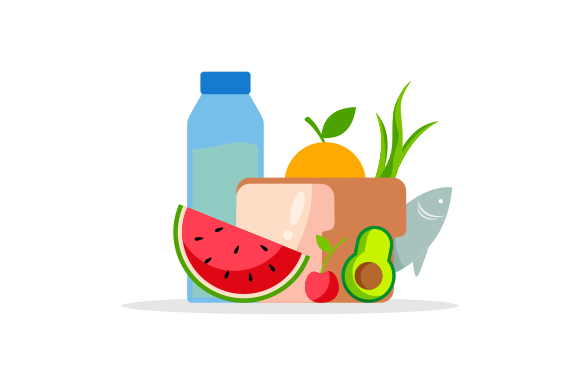
Macronutrients and Micronutrients
Nutrients can be broadly categorized into two groups: macronutrients and micronutrients. Macronutrients include carbohydrates, proteins, and fats, which are required in larger quantities and provide energy for our bodies. Micronutrients, on the other hand, include vitamins and minerals, which are needed in smaller amounts but play critical roles in various bodily functions.
The Role of Macronutrients
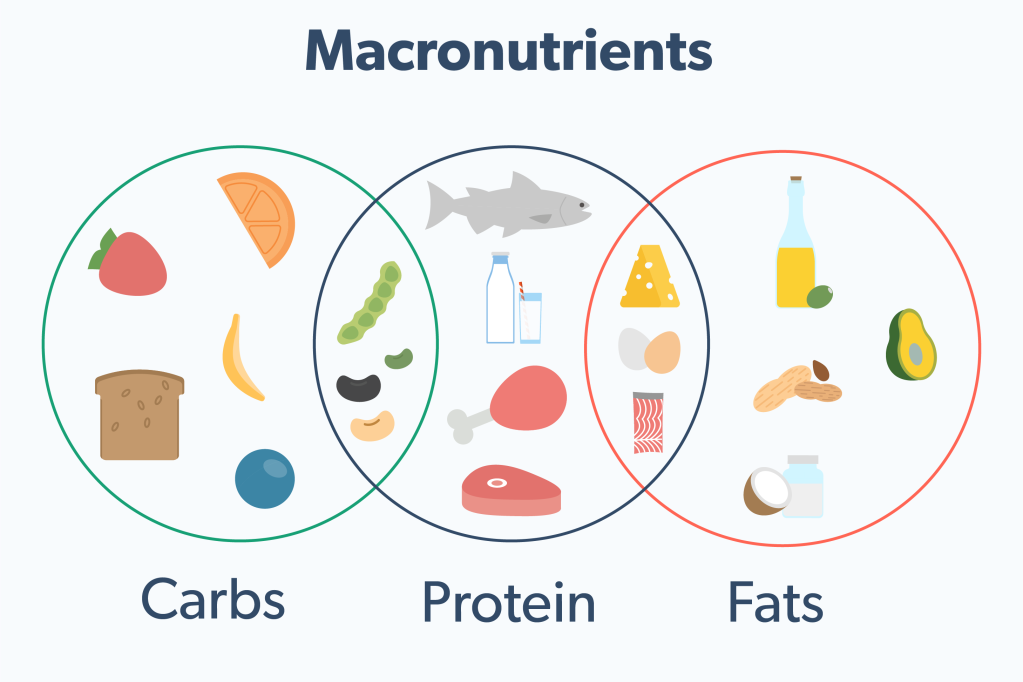
• 🥦 Carbohydrates: Carbohydrates are the primary source of energy for our bodies. They are essential for fueling brain function, muscle performance, and overall vitality. Whole grains, fruits, vegetables, and legumes are excellent sources of healthy carbohydrates.
• 🍗 Proteins: Proteins are the building blocks of our bodies. They are crucial for tissue repair, muscle growth, and the production of enzymes and hormones. Good sources of protein include lean meats, fish, poultry, dairy products, legumes, and nuts.
• 🥑 Fats: Despite their bad reputation, fats are an essential part of a healthy diet. They provide energy, support cell growth, protect organs, and help absorb certain vitamins. Focus on consuming healthy fats from sources like avocados, nuts, seeds, and olive oil.
The Importance of Micronutrients
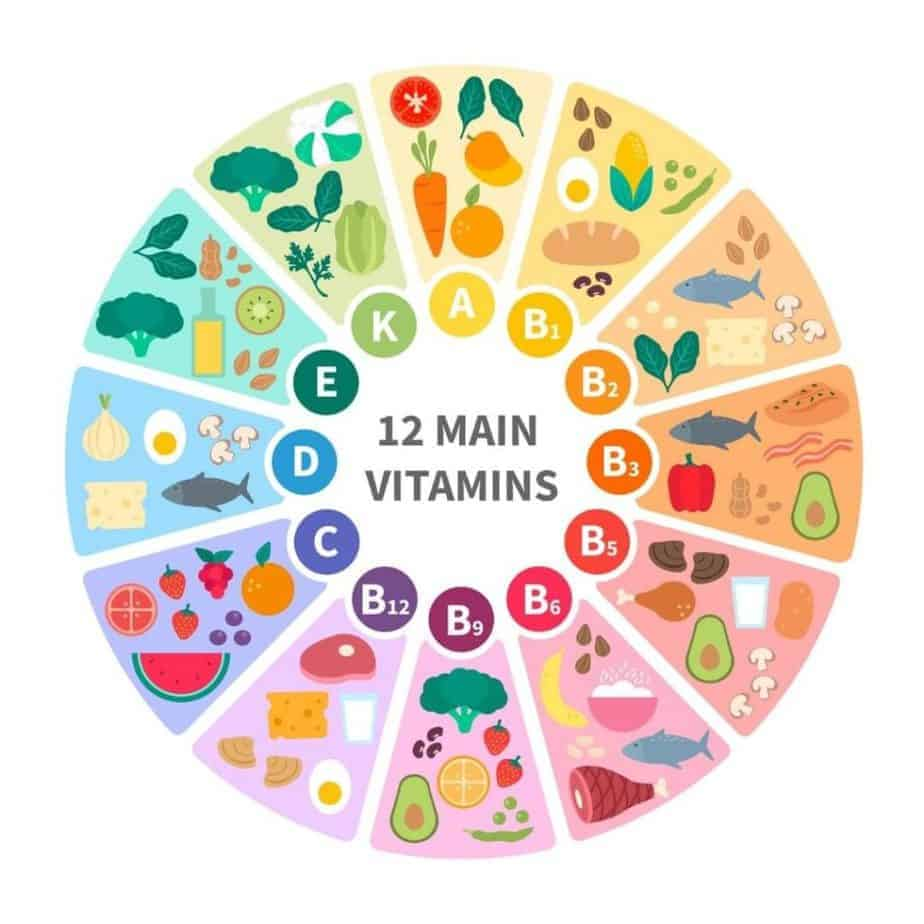
• 🍊 Vitamins: Vitamins are organic compounds that our bodies require in small amounts for various metabolic processes. They play a vital role in energy production, immune function, and overall health. Ensure a diverse diet that includes fruits, vegetables, whole grains, and lean proteins to obtain a wide range of vitamins.
• 💎 Minerals: Minerals are inorganic substances that are necessary for proper bodily functions. They contribute to bone health, nerve function, muscle contraction, and fluid balance. Good sources of minerals include leafy greens, nuts, seeds, dairy products, and whole grains.
Nutrient-Dense Eating
To nourish your body effectively, focus on consuming nutrient-dense foods. These are foods that provide a high amount of essential nutrients relative to their caloric content. Opt for whole, unprocessed foods such as fruits, vegetables, whole grains, lean proteins, and healthy fats. These foods not only provide vital nutrients but also offer various phytochemicals and antioxidants that support overall health.
3. Moving Towards Vitality: Embracing Physical Activity
Physical activity is a crucial component of a healthy lifestyle. Regular exercise not only helps us maintain a healthy weight but also provides numerous benefits for our physical and mental well-being. In this section, we will explore the importance of physical activity and how it contributes to overall vitality.

The Benefits of Exercise
Engaging in regular physical activity offers a wide range of benefits that positively impact our health and performance. Some key benefits include:
• 💪 Improved Cardiovascular Health: Exercise strengthens the heart and improves cardiovascular fitness. It enhances blood circulation, lowers blood pressure, and reduces the risk of heart disease.
• ⚖️ Weight Management: Regular physical activity helps in achieving and maintaining a healthy weight by burning calories and building lean muscle mass. It also boosts metabolism, making it easier to manage weight over time.
• 😊 Enhanced Mental Well-being: Exercise is not just beneficial for the body; it also has a profound impact on our mental health. Physical activity releases endorphins, which are natural mood-enhancing chemicals in the brain, leading to reduced stress, anxiety, and depression.
• ⚡ Increased Energy Levels: Regular exercise improves energy levels and combats fatigue. It promotes better sleep, increases oxygen and nutrient delivery to tissues, and enhances overall vitality.
• 💪 Stronger Muscles and Bones: Physical activity, especially weight-bearing exercises like strength training, helps in building and maintaining strong muscles and bones. It reduces the risk of osteoporosis and enhances overall functional strength.
• 🧠 Improved Brain Function: Exercise has a positive impact on cognitive function, memory, and concentration. It promotes neuroplasticity, the brain's ability to adapt and rewire itself, leading to improved mental clarity and focus.
Types of Physical Activity
There are various types of physical activities, and it's essential to find activities that you enjoy to maintain long-term adherence. Some popular forms of exercise include:
• 🏃♀️ Aerobic Exercise: Activities such as walking, running, swimming, cycling, or dancing that increase heart rate and improve cardiovascular fitness.
• 🏋️♀️ Strength Training: Using resistance, either through weights or bodyweight exercises, to build and strengthen muscles.
• 🤸♀️ Flexibility and Stretching: Exercises that improve flexibility, range of motion, and joint mobility, such as yoga or Pilates.
• 💪 Functional Training: Exercises that simulate real-life movements and enhance overall strength, stability, and coordination.
• 🧘♀️ Mind-Body Practices: Activities like yoga, tai chi, or meditation that focus on the mind-body connection, promoting relaxation, mindfulness, and stress reduction.
Incorporating Physical Activity into Your Routine
To embrace physical activity and make it a sustainable part of your life, consider the following tips:
• 🎉 Find Activities You Enjoy: Choose activities that you genuinely enjoy, as it will increase your motivation and make exercise more enjoyable.
• 🎯 Set Realistic Goals: Start with realistic goals and gradually increase the intensity and duration of your workouts over time.
• 📅 Make it a Habit: Schedule regular exercise sessions and treat them as important appointments. Consistency is key to reaping the benefits of physical activity.
• 🌞 Mix it Up: Incorporate a variety of exercises to keep things interesting and work different muscle groups. This also helps prevent boredom and plateaus.
• 👂 Listen to Your Body: Pay attention to your body's signals and avoid overexertion or pushing through pain. Respect your limits and rest when needed.
4. Illuminating Your Well-being: Harnessing the Power of Sunlight
Sunlight is an abundant and natural source of light and energy that plays a vital role in our overall well-being. Beyond its role in providing illumination, sunlight offers numerous benefits for our physical and mental health. In this section, we will explore the importance of sunlight and how we can harness its power to enhance our well-being.

The Benefits of Sunlight
Sunlight provides various benefits that contribute to our well-being and vitality. Here are some key benefits:
• ☀️ Vitamin D Synthesis: Sunlight exposure is essential for the synthesis of vitamin D in our bodies. Vitamin D plays a crucial role in bone health, immune function, and the prevention of certain diseases.
• 😄 Mood Enhancement: Sunlight exposure stimulates the production of serotonin, a neurotransmitter associated with mood regulation and feelings of happiness. Adequate sunlight can help alleviate symptoms of depression and improve overall mental well-being.
• 💤 Sleep Regulation: Exposure to natural sunlight helps regulate our body's internal clock, known as the circadian rhythm. This helps maintain a healthy sleep-wake cycle, promotes better sleep quality, and improves overall sleep patterns.
• 🌱 Boosted Immunity: Sunlight exposure has been linked to enhanced immune function, leading to a reduced risk of various infections and diseases.
• 🧠 Improved Cognitive Function: Sunlight exposure has been shown to have positive effects on cognitive function, memory, and attention span. It can help increase focus, productivity, and mental clarity.
• 🌞 Skin Health: Moderate sunlight exposure can be beneficial for certain skin conditions, such as psoriasis, eczema, and acne. It promotes vitamin D synthesis in the skin and can help alleviate symptoms.
Safe Sunlight Practices
While sunlight offers numerous benefits, it's important to practice safe sun exposure to protect our skin and overall health. Here are some guidelines to follow:
• ⏰ Time of Day: Avoid direct sunlight during the peak hours of 10 a.m. to 4 p.m. when the sun's rays are the strongest. Seek shade or stay indoors during this time if possible.
• 🧴 Use Sunscreen: When spending time outdoors, especially during prolonged sun exposure, use a broad-spectrum sunscreen with at least SPF 30. Apply it generously to all exposed skin, and reapply every two hours or more frequently if sweating or swimming.
• 👕 Wear Protective Clothing: Cover your skin with lightweight, loose-fitting clothing that provides adequate sun protection. Don't forget to wear a wide-brimmed hat and sunglasses to shield your face and eyes from harmful UV rays.
• 🌿 Gradual Exposure: If you have limited sun exposure or are prone to sunburn, gradually increase your time in the sun to allow your skin to adapt. Start with shorter durations and gradually increase as tolerated.
• 💧 Stay Hydrated: Sun exposure can increase the risk of dehydration. Drink plenty of water throughout the day to stay hydrated and support overall well-being.
Incorporating Sunlight into Your Routine
To make the most of sunlight's benefits, consider the following tips:
• 🏞️ Spend Time Outdoors: Incorporate outdoor activities into your routine to maximize sunlight exposure. Take walks, exercise, or simply relax in outdoor settings whenever possible.
• 🏡 Create a Sunlit Environment: Open curtains and blinds to allow natural light into your home or workspace. Arrange furniture to maximize exposure to sunlight during the day.
• 🌳 Garden or Nature Time: Engage in gardening or spend time in nature to immerse yourself in sunlight while enjoying the benefits of being surrounded by greenery.
• ⏱️ Plan Sunlight Breaks: Take short breaks during the day to step outside and soak up some sunlight. Even a few minutes of exposure can have a positive impact on your well-being.
• ⚖️ Balance Sunlight and Protection: Find the right balance between maximizing sunlight exposure and practicing sun protection. Aim for moderate and safe sun exposure without risking sunburn or skin damage.
5. Nurturing Connections: The Power of Relationships
Human beings are social creatures, and our connections with others play a vital role in our overall well-being. Meaningful relationships can provide us with emotional support, companionship, and a sense of belonging. In this section, we will explore the power of relationships and how nurturing connections can positively impact our well-being.

The Impact of Relationships on Well-being
Building and maintaining healthy relationships can have a profound effect on various aspects of our well-being, according to Dr. Huberman. Here are some key ways in which relationships can influence our lives:
• 💑 Emotional Support: Relationships offer a valuable source of emotional support during challenging times. Having someone to share our joys, sorrows, and concerns with can provide comfort and help us navigate through life's ups and downs.
• 💆 Reduced Stress: Strong social connections have been shown to reduce stress levels. The support and understanding we receive from loved ones can help buffer the effects of stress and promote resilience.
• 🧠 Improved Mental Health: Positive relationships contribute to better mental health outcomes. Feeling connected and valued by others can boost self-esteem, reduce feelings of loneliness, and decrease the risk of developing mental health disorders.
• 💪 Physical Health Benefits: Research suggests that individuals with strong social ties tend to have better physical health. They may have lower blood pressure, reduced risk of chronic diseases, and faster recovery rates from illnesses.
• 🤝 Sense of Belonging: Building relationships fosters a sense of belonging and community. It creates a network of individuals who share common interests, values, and experiences, providing a supportive environment where we feel understood and accepted.
Nurturing Healthy Relationships

To cultivate and nurture healthy relationships for your well-being, consider the following practices:
- 💬 Communication: Effective communication is key to building strong relationships. Practice active listening, express your thoughts and feelings honestly and respectfully, and make an effort to understand others' perspectives.
- ⏰ Quality Time: Dedicate time to spend with your loved ones and prioritize meaningful interactions. Engage in activities together, have regular conversations, and create shared experiences that strengthen your bond.
- 🤝 Mutual Support: Show support and empathy towards your loved ones. Be there for them in times of need, offer encouragement, and celebrate their successes. A reciprocal exchange of support strengthens relationships.
- 🚧 Boundaries: Establish healthy boundaries in relationships to ensure mutual respect and maintain individual well-being. Communicate your needs and expectations, and encourage open dialogue to address any conflicts or challenges that may arise.
- 🌍 Social Engagement: Engage in social activities and communities that align with your interests and values. Join clubs, organizations, or participate in group activities that allow you to connect with like-minded individuals and expand your social network.
Recap
We have explored the five pillars of health and performance: sleep, nutrition, movement, light, and relationships. Each pillar plays a crucial role in transforming our overall well-being and enhancing our performance in various aspects of life. It is important to recognize the interconnectedness of these pillars and the impact they have on one another.
To truly transform our well-being and performance, it is crucial to integrate these five pillars into our daily lives. By prioritizing quality sleep, nourishing our bodies with wholesome foods, engaging in regular physical activity, optimizing our light exposure, and nurturing meaningful relationships, we can experience long-term benefits and lead a healthier and more fulfilling life.
I encourage you to take proactive steps toward implementing these pillars into your daily routine. Start by identifying areas where you can make positive changes and gradually incorporate these practices into your lifestyle. Remember that small, consistent actions over time can lead to significant transformations.
Embrace the power of the five pillars and embark on a journey of self-care and personal growth. By nurturing your body, mind, and relationships, you have the potential to unlock your true potential and live a vibrant and purposeful life.

